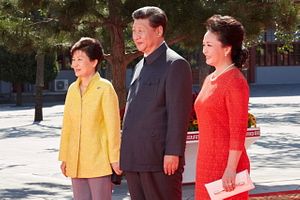On September 3, while Chinese troops and military equipment paraded through Tiananmen Square and Xi Jinping delivered a ringing rebuke of Japanese military aggression, South Korean President Park Geun-hye watched from a position of honor on Tiananmen Gate. During the parade, Park sat to the left of Xi’s wife, Peng Liyuan, who was herself sitting to the left of Xi. Russian President Vladimir Putin was seated on Xi’s right.
Park’s attendance was watched with some concern in the United States. Those who believe Park’s administration is “tilting” toward China at the expense of the U.S. pointed to her presence at the parade as proof. The South Korea-China relationship has certainly been an active one — this was Park’s sixth summit meeting with Xi and third trip to China, all since Park assumed office in February 2013.
In their meeting on Wednesday, Xi praised Park for her efforts to improve the relationship, telling her that, thanks to their joint personal support, “the Korea-China relationship has become the best-ever national relationship in history.” As evidence, he pointed to the recently-concluded free trade agreement between China and South Korea, as well as Seoul’s decision to join the China-led Asian Infrastructure Investment Bank.
However, South Korean media argued that Park’s intention this time around was simple: to seek closer cooperation with China in the hopes of making progress on the North Korea issue.
Discussions of North Korea figured prominently in Park’s meeting with Xi. According to Yonhap, Park and Xi both warned North Korea against actions that could raise tensions on the Korean Peninsula. They also called for restarting talks on the North’s nuclear program. According to Cheong Wa Dae, both sides “called for the resumption of meaningful dialogue through the Six-party Talks at an early date,” citing the Iran deal as a positive example.
South Korea’s presidential office also said that Park particularly thanked China for its role in helping end recent tensions: “I would like to thank China for its constructive role in closely communicating with us in order to resolve the latest tension on the Korean Peninsula.” After an exchange of fire across the Demilitarized Zone in mid-August, Seoul and Pyongyang negotiated an agreement deescalating the situation.
Xinhua, China’s state news agency, said that Xi reiterated China’s commitment to a denuclearized Korean peninsula. Xi also told Park that China was willing to continue coordinating with South Korea on regional issues (including the situation on the Korean Peninsula) as well as international issues.
North Korea was represented at the parade by Choe Ryong-hae, secretary of the Korean Worker’s Party and a close aide to leader Kim Jong-un. Both Choe and Park attended a welcoming banquet for visiting dignitaries on September 2, but a South Korean presidential spokesperson said the two did not meet.
Unsurprisingly, South Korea and China’s joint experience as the targets of Japanese colonialism and aggression also figured prominently in the celebrations of the 70th anniversary of the end of World War II. Xi praised China and Korea’s joint efforts to fight against Japanese imperialism. Park, meanwhile, pointed to a shared “time of great adversity” (meaning their experiences under Imperial Japan) as “a precious foundation for the friendship of both nations.”
After the parade, Park headed to Shanghai, where the Republic of Korea’s provisional government was headquartered while Korea was a Japanese colony. Park attended a ceremony for the reopening of the historical site. Kim Jin-gon, consul for cultural affairs at the ROK consulate in Shanghai, told China Daily that China offered great support to Korean independence activists while the peninsula was under Japanese control. The provisional government headquarters is “of great significance to both” China and South Korea, Kim said.
While in Shanghai, Park also planned to attend a business forum. People’s Daily noted that Park brought South Korea’s “largest-ever business delegation to China” on this trip, with “156 business executives and representatives of economic organizations” coming with her to Beijing and Shanghai.
































